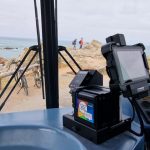Overriding OEM opinion is that viable electrification for coaches remains far away. But what else can be done to otherwise help mitigate their environmental impact? Lots, says German manufacturer MAN
Electrification is flavour of the month in some quarters of the industry, but internal combustion engines are destined to remain a long-term part on the coach sector. To that end, MAN last week revealed some of the work that it is doing to make them fit for the future.
Tied in with that was the unveiling of the new nine-litre D15. Developing up to 360bhp, the D15 will come here in MAN’s RR2 and RR8 coach chassis in 2019. It satisfies Euro 6d, which in time will be required of all new diesel engines.
MAN is muted on its plans for the 12.4-litre D26 – standard in the RR4 and Neoplan Tourliner – at Euro 6d.
But Head of Powertrain Engineering Thomas Nickels says there is more to come from an engine that has already proven itself to be among the best at Euro 6c.
He also outlined MAN’s early thinking on how to reduce coaches’ environmental impact. That will be a focus in the future, as it believes that electric power over long distances is a non-starter.
While further reductions in NOx and particulates are difficult to achieve, and will have a negligible impact on air quality, MAN’s parent Volkswagen (VW) has something at the early stages that may ultimately render coaches almost carbon neutral – without a battery, fuel cell or gas tank in sight.
D stands for Difficult
Euro 6d is the next iteration of the current standard. It will be introduced in two stages: First on new engine designs and then on existing models, and it brings a change to how compliance is measured.
“At Euro 6c, we take readings at 50% engine load. At Euro 6d that loading becomes 10%, at which the limits are more difficult to achieve,” says Thomas. That difficulty arises because NOx and particulates are measured in grammes per kW/h. The low loading mandated at Euro 6d means that it is tough to generate enough heat in the exhaust to allow it to function as it needs to.
The D15 gives some idea of what may be seen on the D26 at Euro 6d. Significantly, the D15 does not utilise EGR, relying solely on SCR. It also uses heat management to ensure that both the engine and the oil within it reach operating temperature as rapidly as possible.
Key at Euro 6d is ensuring that the exhaust is hot at very low engine loads. MAN has not opted to fit heating apparatus in the D15’s aftertreatment box. Instead, it makes an adjustment in the manifold to generate heat.
“Diesel engines are designed to work hard. They are not intended to idle, which is what a 10% load represents,” says Thomas. “Satisfying Euro 6d is difficult, but on the D26 it will be something worth waiting for.”

Carbon-free coaches coming?
Both MAN and Daimler are of the opinion that electric power in coaches it is not viable without a revolution in battery energy density. Neither OEM anticipates coach electrification any time soon, if ever, although short-distance engine-off capability is likely.
Carbon reduction is a different matter, and MAN is taking the first steps in examining a new fuel that had been pioneered by fellow VW subsidiary Audi.
Dubbed E-diesel, it is a renewable liquid that is compatible with existing engines after modification. Its energy density is slightly less than that of fossil diesel, but it can be transported in the same manner.
“E-diesel is synthetic. It is not biodiesel. Creating it starts with using renewable electricity to generate hydrogen, which is then combined with CO2 removed from the atmosphere to create synthetic oil. The oil is then refined, producing E-diesel,” says Thomas.
That CO2 is re-emitted when the E-diesel is burned, and the emissions that it generates require the same aftertreatment as conventional diesel, but no CO2 is created. As a result, E-diesel’s carbon footprint is negligible.
“There is no obvious battery solution for coaches, so synthetic diesel is the best option,” he says. “Adding equipment to allow short-distance zero-emission running makes no sense from an engineering perspective. It will be used for a small percentage of the time, and for the remainder, it is additional weight that leads to increased CO2 production.”
What are the next steps?
MAN has already started examining what engine modifications will be required to allow the use of E-diesel. Thomas estimates that 2025 may be when its use starts to become widespread in higher-mileage applications.
Euro 7 will come too, he is sure. And while electric may have started to dominate some bus fleets in a decade’s time, range limitations are likely to mandate that liquid fuel and internal combustion engines will still be needed for coaches.
Mitigating their environmental impact is where the technical chiefs of MAN and its competitors will earn some of their money in coming years. Thus far, those in Nuremberg are proving that they are up to the challenge.

























